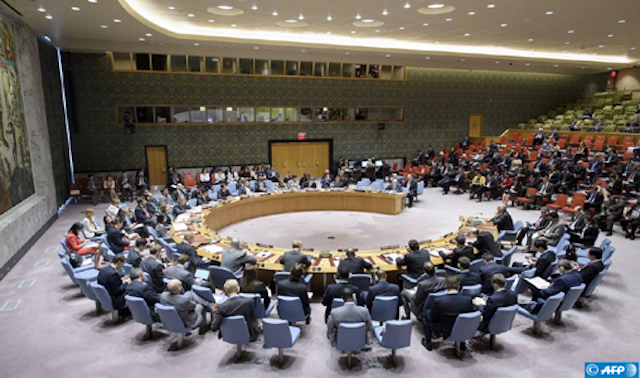Updated
The 40-year struggle between Morocco and the Algerian-backed Polisario for control of the Western Sahara: The United States has Two Choices – Ambassador Edward M. Gabriel (ret.)

The United States reaffirms at the UNSC that the autonomy plan is “serious, credible and realistic” – April 27, 2018 MAP Express
Ambassador Edward M. Gabriel (ret.)
December 17, 2018
 As someone who has closely followed the Western Sahara conflict for the past twenty years, it is apparent to me that the United States has only two choices to address the issue. Either it can maintain the status quo, as it has pretty much done since 2008 (i.e. do nothing), or it can use its clout to push for a compromise political settlement between Morocco, Algeria and their Polisario client, which had been the preferred option during the Clinton and Bush Administrations.
As someone who has closely followed the Western Sahara conflict for the past twenty years, it is apparent to me that the United States has only two choices to address the issue. Either it can maintain the status quo, as it has pretty much done since 2008 (i.e. do nothing), or it can use its clout to push for a compromise political settlement between Morocco, Algeria and their Polisario client, which had been the preferred option during the Clinton and Bush Administrations.
As a matter of US policy, the idea of a winner-take-all referendum among the people of the Western Sahara to decide whether to integrate with Morocco or create a separate state has been dead since the Fall of 1999. It’s about time the UN Security Council and the Permanent Five Members, including the U.S., quit the diplomatic double talk and call it for what it is.
For the past ten years, the U.S. and the UN have satisfied Morocco’s concerns by calling their compromise initiative of granting autonomy under Moroccan sovereignty “realistic, serious, and credible,” but they never took concrete action to move the issue towards resolution. The verbal endorsements were usually satisfactory to the Moroccans, as they were at least much stronger than the UN acknowledgement of the Polisario position, of which it only “took note.”
American policymakers prefer not to tamper with something that’s not causing problems and, in this case, do not want to choose between Morocco and Algeria. After all, they reason, Algeria could become as important in the future as Morocco. They say the current situation is causing the US no harm and the chances are too risky to do something now — and besides, they often add, it’s more of a European or Arab problem.
Americans also claim, time and again, that Moroccan diplomats are not seriously pressing them for a solution, but rather simply arguing over symbolic language during the yearly mandate renewal of the UN peacekeeping mission, MINURSO. It is often alleged that Morocco is not creating circumstances on the ground in the Sahara that would invite US or international support. One hears repeatedly from US policy makers that the Sahara question is “not ripe for action” and that it is best to simply “leave well enough alone.”
Such rhetoric underscores the State Department’s usual course of action: be cautious and avoid risks as much as possible. It sounds like a reasonable policy choice so long as it is confident that matters will not deteriorate in the region, that Morocco will always be in control of the territory, and that the situation will slowly turn in Morocco’s favor. However, this puts the US in a reactive, rather than proactive position.
Discontent in Morocco and in the region is on the increase. The people of the Sahara, who slowly came to support the U.S.-Morocco proposal for autonomy, hear mostly words now, and don’t see enough persuasive action on the ground supporting the rhetoric. Likewise, Moroccan governmental decentralization in the Sahara seems to be proceeding at a glacial pace.
Most Moroccan analysts don’t believe this can last forever. The US currently thinks it can continue to “kick the can down the road,” as the Sahara poses no immediate threat. There is much to lose, however, if this calculation is wrong and insecurity and discontent increase.
The US has made it clear it does not want to see another failed state in the region, and has pointed to the Western Sahara as one possible example. Right now, much of the Middle East is in turmoil, from the Gulf states, to Iraq, Syria and Lebanon, to Libya. Egypt is becoming an unreliable partner as it flirts with Russia and China. Even our long partnership with Saudi Arabia is troubled. What if instability came to Morocco, Tunisia, and Jordan? What shape would the region take without these American friends, and what would happen to America’s influence? The Western Sahara is an existential issue for Morocco. If its position there is weakened, Morocco’s sovereignty and regional influence could be sapped with potentially serious and dangerous consequences for the entire region.
The other option is for the US to pick up where Presidents Clinton and Bush left off. In the past, it has taken the position of encouraging Morocco to advance its own autonomy proposal and promised to support its efforts. Currently, many analysts are concerned that the Moroccan reform agenda is slowing down. The time may be ripe to achieve two important American objectives by assisting Morocco in its drive for democratic and economic openness, and enhancing stability in North Africa by encouraging a realistic political solution to the Sahara problem.
My colleague Bob Holley suggests it’s time for UN Personal Envoy, Hans Kohler, to float his own initiative to break the logjam based upon the autonomy proposal as a basis for negotiations among the Parties. The US and UN should endorse this approach. If the Polisario refuses, the UN Security Council and/or key members of the Permanent Five (France, the UK, and the US) should join with Morocco in creating facts on the ground in the Sahara through their support of local governance, economic and social development programs, high level visits from US officials, and other actions that demonstrate that the autonomy train is moving down the tracks.
The US could also leverage its support for the Western Sahara with Morocco’s stated desire to move its reform process forward. It once called Morocco the model for change in the region, and now sees the need for it to speed up reforms on human rights, governance, decentralization, and rule of law. It should enter into an agreement with Morocco to assist in supporting and speeding up the reform process which Morocco has called “irreversible”, while also guaranteeing to stand more actively by its side on the Sahara question.
For more information on the history of U.S. policy on the Sahara go to the Moroccan American Center’s fact sheet.